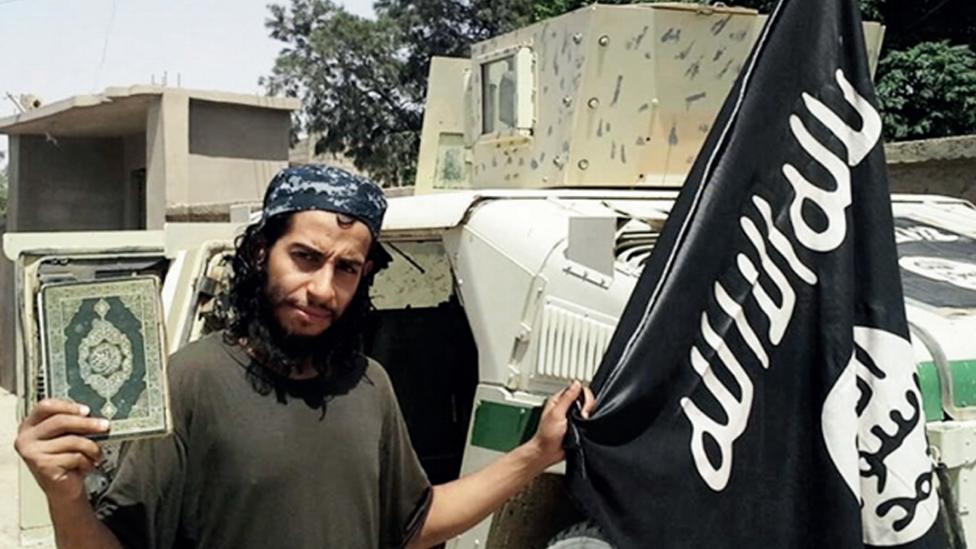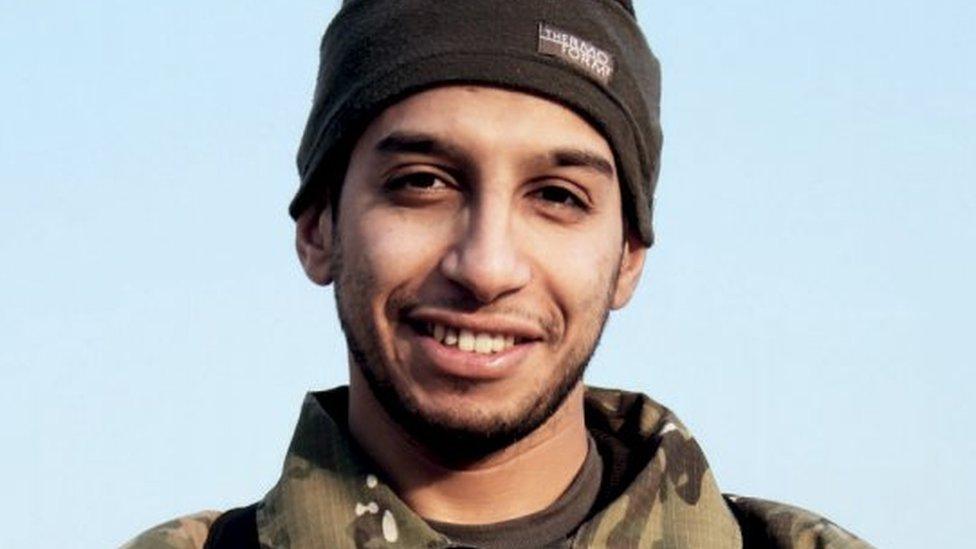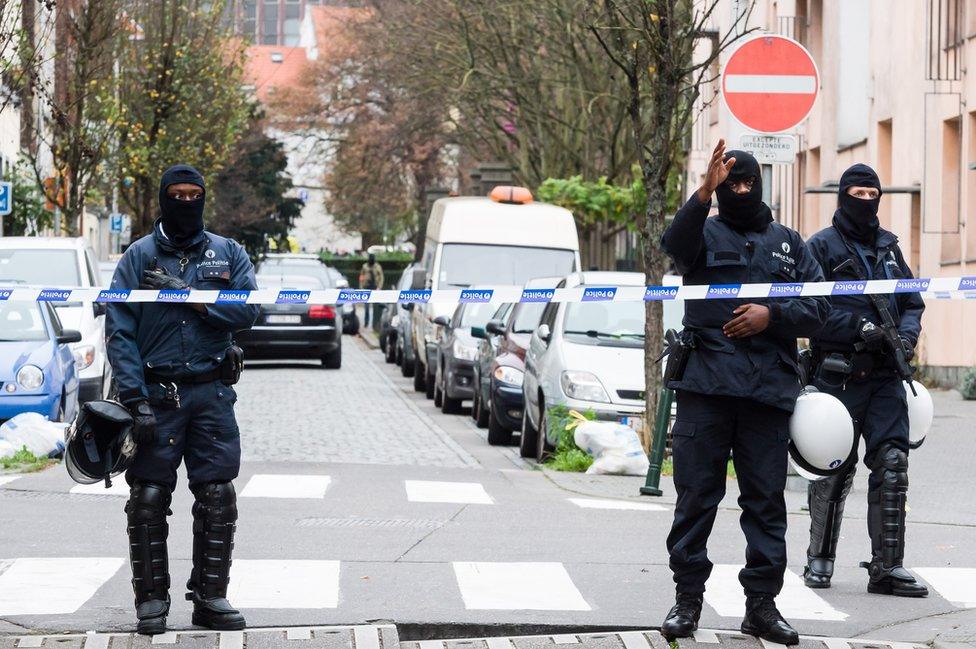Paris attacks: Who was Abdelhamid Abaaoud?
- Published

A man said to be Abaaoud poses with a Koran and IS flag - the date is not known
French investigators believe Abdelhamid Abaaoud, the jihadist killed in a police raid on Wednesday, organised last week's Paris attacks which killed at least 129 people.
Abdelhamid Abaaoud, a Belgian national of Moroccan descent, grew up in Molenbeek, a district of Brussels known for its many Arab immigrants and blighted by high unemployment.
The 28-year-old was an associate of attacks suspect Salah Abdeslam, who is on the run and whose brother Brahim blew himself up in Paris on 13 November.
Brahim died in the Comptoir Voltaire bar, without killing others, while at least six other jihadists carried out deadly suicide attacks elsewhere. They are all believed to have been recruited by the Islamic State militant group (IS).
Abaaoud had been implicated in four out of six foiled attacks since this spring in France and sentenced to 20 years in prison in absentia, French Interior Minister Bernard Cazeneuve said.
He added that all the thwarted plots had the same modus operandi, saying the "planning from abroad of a violent act by jihadists (was) from European countries, trained in the use of weapons and then sent to our territory to carry out the attacks".
An international arrest warrant was also issued for Abaaoud, Mr Cazeneuve said.
Abaaoud - alias Abu Umar al-Baljiki - is believed to have joined IS in early 2013.

In February the IS online magazine Dabiq identified this man as Abaaoud (date not known)
There was confusion about his whereabouts prior to his death, with IS claiming he was in Syria.
The group may have lied about his location to divert attention from him following the Charlie Hebdo attacks and the Verviers raid.
Jihadists often mislead intelligence agencies about the whereabouts of their militants, invoking the concept that "war is deception".
But his presence in France raises big questions about security failings in France and the 28-member European Union.
"No information from European countries he could have passed through before arriving in France was communicated to us," Mr Cazeneuve said.
He added that it was only on 16 November - three days after the attacks - that "intelligence services of a country outside Europe indicated they had knowledge of his presence in Greece," he said, without saying which country.
Jihadist hotbed
It is not clear when Abaaoud became radicalised. The Associated Press reports that he attended one of Belgium's top secondary schools - Saint-Pierre d'Uccle.
But he dropped out, or was thrown out, and became involved in petty crime, where he first became known to the authorities.
He was in contact with Mehdi Nemmouche, a jihadist of Franco-Algerian origin, who shot and killed four people at the Jewish Museum in Brussels in May 2014.
Nemmouche had also spent time in Molenbeek - an area where, Belgian officials admit, the radical Salafist ideology has flourished among some young Muslims.
In recent years, Molenbeek has had "the highest concentration of foreign terrorist fighters in Europe", said Liesbeth van der Heide, at Leiden University's Centre for Terrorism and Counterterrorism, in the Netherlands.
Per head of population, some of the highest numbers of jihadists have left Belgium to fight in Iraq and Syria compared with other EU countries.

Armed police conducted searches in Molenbeek on Monday
Belgian authorities suspect that Abaaoud helped organise and finance a terror cell in Verviers, eastern Belgium. It was broken up in a police raid in January.
Two jihadists were killed in Verviers - identified by IS later as Khalid Ben Larbi (alias Abu Zubayr, 23) and Soufiane Amghar (alias Abu Khalid, 26).
Mutilated bodies
In an interview published by the IS English-language magazine Dabiq in February, Abaaoud talked about the Verviers incident.
He said he had secretly returned to Belgium with the other two, and they had "set up a safe house while we planned to carry out operations against the crusaders".
"The intelligence knew me from before as I had been previously imprisoned by them," he said, boasting that he had still managed to slip away after the Verviers raid.
"I was even stopped by an officer who contemplated me so as to compare me to the picture, but he let me go, as he did not see the resemblance! This was nothing but a gift from Allah."
An IS propaganda video in 2014 showed Abaaoud in a vehicle that was dragging mutilated bodies behind it.
Soon after, Abaaoud recruited his 13-year-old brother to join him in Syria - making him one of IS's youngest recruits.
Abaaoud was also linked to a foiled attack aboard a Thalys express train from Amsterdam to Paris in August 2015. A gunman, Ayoub El-Khazzani, was overpowered by passengers aboard the high-speed train as it travelled through northern France towards Paris.
Abaaoud was also listed as a suspect in a foiled attack in April on a church concert hall in the southern Paris suburb of Villejuif.
An Algerian man was arrested over the alleged plan, after he apparently shot himself by accident and called an ambulance.